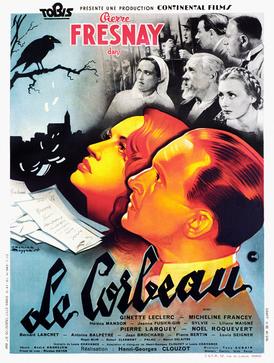
Le Corbeau is a 1943 French film noir directed by Henri-Georges Clouzot and starring Pierre Fresnay, Micheline Francey and Pierre Larquey. The film is about a French town where a number of citizens receive anonymous letters containing libelous information, particularly targeting a doctor accused of providing abortion services. The mystery surrounding the letters eventually escalates into violence.

Millionaires for One Day is a 1949 French comedy film directed by André Hunebelle and starring Gaby Morlay, Jean Brochard and Ginette Leclerc. It was shot at the Francoeur Studios in Paris. The film's sets were designed by the art director Lucien Carré. It was produced and distributed by Pathé.

Monsieur Taxi is a 1952 French comedy film directed André Hunebelle and starring Michel Simon and Jane Marken and Jean Brochard. It is about Pierre Verger, who is nicknamed Monsieur Taxi and always in company of a smart young dog called "Gangster". It was shot at the Saint-Maurice Studios in Paris and on location around the city including in Saint-Maur-des-Fossés. The film's sets were designed by the art director Lucien Carré.
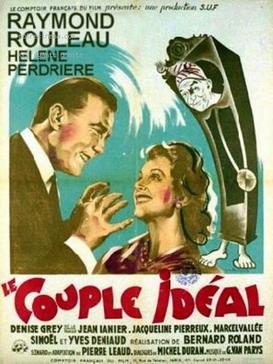
The Ideal Couple is a 1946 French comedy film directed by Bernard-Roland and Raymond Rouleau and starring Raymond Rouleau, Hélène Perdrière and Denise Grey.

Jericho is a 1946 French war film directed by Henri Calef based on Operation Jericho. It wss shot at the Epinay Studios of Eclair in Paris.
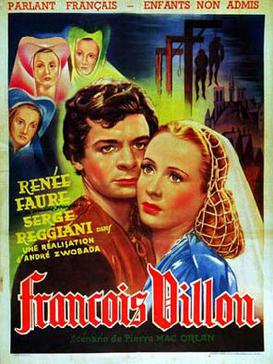
François Villon is a 1945 French historical drama film directed by André Zwoboda and starring Serge Reggiani, Jean-Roger Caussimon and Henri Crémieux. It portrays the life of the fifteenth century writer François Villon. The film was inspired by the play If I Were King by Justin Huntly McCarthy.

Marinella is a 1936 French comedy film directed by Pierre Caron and starring Tino Rossi, Yvette Lebon and Jeanne Fusier-Gir.

My Husband Is Marvelous is a 1952 French comedy film directed by André Hunebelle and starring Fernand Gravey, Sophie Desmarets and Elina Labourdette. The film's sets were designed by the art director Lucien Carré. While a follow-up to the 1951 film My Wife Is Formidable which had the same director and cast, it is not a sequel.
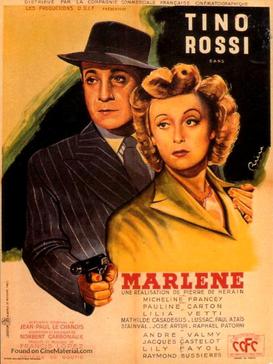
Marlene is a 1949 French musical crime film directed by Pierre de Hérain and starring Tino Rossi, Micheline Francey and Lily Fayol. The film's sets were designed by the art director Paul-Louis Boutié.

Fantomas Against Fantomas is a 1949 French mystery thriller film directed by Robert Vernay and starring Marcelle Chantal, Aimé Clariond and Alexandre Rignault. It portrays the fictional master criminal Fantomas, who has had numerous films depicting his adventures.
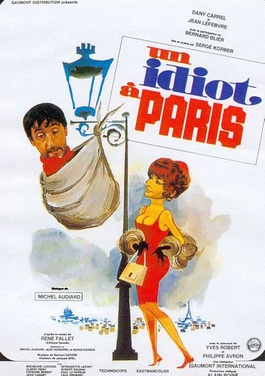
An Idiot in Paris is a 1967 French comedy film directed by Serge Korber and starring Dany Carrel, Jean Lefebvre and Bernard Blier.

The Phantom Carriage or The Phantom Wagon is a 1939 French drama film directed by Julien Duvivier and starring Pierre Fresnay, Marie Bell and Micheline Francey. It is based on the novel Thy Soul Shall Bear Witness! by Selma Lagerlöf, which had previously been adapted into the 1921 Swedish silent film The Phantom Carriage by Victor Sjöström.

The Village of Wrath is a 1947 French drama film directed by Raoul André and starring Louise Carletti, Paul Cambo and Micheline Francey. The film's sets were designed by the art directors Louis Le Barbenchon and Raymond Nègre.

The White Waltz is a 1943 French drama film directed by Jean Stelli and starring Lise Delamare, André Alerme and Aimé Clariond. It was produced and released during the German occupation of France.

Destiny is a 1946 French musical comedy drama film directed by Richard Pottier and starring Tino Rossi, Micheline Francey and Mila Parély. The film's sets were designed by the art director Robert Hubert.

The President is a 1938 French comedy film directed by Fernand Rivers and starring Elvire Popesco, Henri Garat and André Lefaur. It is based on the 1912 play of the same title by Maurice Hennequin. The film's sets were designed by the art director René Renoux. The play was adapted again for the 1952 Italian film Mademoiselle Gobete.

Vertigo is a 1947 French drama film directed by Richard Pottier and starring Raymond Rouleau, Micheline Francey and Jean Debucourt. The film's sets were designed by the art director Robert Hubert.

The Eleven O'Clock Woman is a 1948 French mystery thriller film directed by Jean Devaivre and starring Paul Meurisse, Micheline Francey, Gilbert Gil and Pierre Renoir. It is based on the 1938 novel of the same title by Pierre Apestéguy. It was shot at the François 1er Studios in Paris and on location around the city. The film's sets were designed by the art director Robert Hubert.

The Exile's Song is a 1943 French musical drama film directed by André Hugon and starring Tino Rossi, Ginette Leclerc and Aimé Clariond. It was shot at the Cité Elgé Studios in Paris. The film's sets were designed by the art director Maurice Bernard. It was produced during the German Occupation of France.

Fever is a 1942 French drama film directed by Jean Delannoy and starring Tino Rossi, Jacqueline Delubac and Ginette Leclerc. Location shooting took place around Royan in the Occupied Zone, although it is set in Provence. The film's sets were designed by the art directors Marcel Magniez and Pierre Marquet.




















